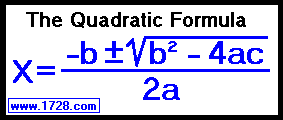How do you solve #x^2+3x+2=0# using the quadratic formula?
1 Answer
The two solutions are
Explanation:
Since this question is given in standard form, meaning that it follows the form:

I think it's worthwhile to mention that
Now, we just plug our values into the equation like this:
For these type of problems, you will obtain two solutions because of the
Now, we subtract
Therefore, the two possible solutions are:

